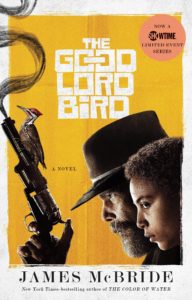Review of The Good Lord Bird, by James McBride
 I love writing historical fiction. Digging up dry bare bones of long-dead people and reassembling them with imagined personalities, motives and quirky character traits. In both the writing and the reading, one can break the chains of current reality and escape, Houdini-like, into an imagined fantasy world. At the end, most authors bring you back to earth with an “Afterword” or “Author’s Note” that distinguishes fact from fiction.
I love writing historical fiction. Digging up dry bare bones of long-dead people and reassembling them with imagined personalities, motives and quirky character traits. In both the writing and the reading, one can break the chains of current reality and escape, Houdini-like, into an imagined fantasy world. At the end, most authors bring you back to earth with an “Afterword” or “Author’s Note” that distinguishes fact from fiction.
Not so with James McBride’s The Good Lord Bird. This rousing romp through John Brown’s quixotic and bloody attempt to liberate slaves at Harper’s Ferry in 1859 left me breathlessly scanning Wikipedia entries to figure out what was real and what was fake.
McBride’s fictional narrator is a young Negro boy nicknamed “Onion,” who dresses like a girl, gets “adopted” by Brown and dragged into the “Old Man’s” hardscrabble army of liberation. More worried about saving his own skin than freeing his fellow slaves, Onion regales us with canny observations of the real people and events in the story, along with a whole dictionary’s worth of memorable metaphors. Of Brown’s mentally-challenged son Fred, Onion tells us “his brain was muddy. His cheese had pretty much slid off his biscuit.” Getting hunted by pro-slavers, he(she) quips, “weren’t a notion that throwed a lot of sugar in my bowl.”
Through Onion’s eyes we witness the slow unwinding of John Brown’s bible-inspired dream of provoking a massive slave rebellion. His followers split into realists who abandon the cause, and true believers who stay devoted to the disastrous end. Brown clings ever more fervently to his alternate reality even as his fantasy world washes away in a flood of facts.
Kind of like our soon-to-be former President.
But there the similarity ends. As Onion tells us, “the Old Man was a lunatic, but a good, kind lunatic…he had the weight of my people on his shoulders. It was him who left house and home behind for something he believed in.”
Funny, sad, and at times profound, this book definitely belongs on your reading list.
David Jessup, December 15, 2020
